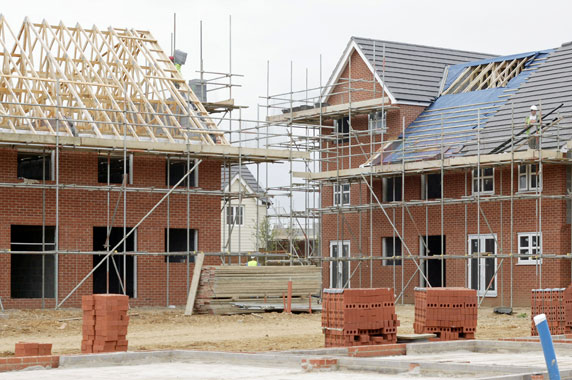The Federation of Master Builders (FMB) has welcomed measures in the Autumn Budget, including pulling back on the landfill tax, £48 million to boost planning capacity, and free apprenticeship training for under-25s in SMEs.
However, the previously announced wage rises will hit small business squeezed bottom lines and the lack of action on domestic retrofit and dropping of ECO scheme leaves a gap in how the country will upgrade it's old housing stock.
Brian Berry, Chief Executive of the FMB, said the announcement on landfill tax reform is a big win for small house builders, saving them thousands on new build costs.
“Alongside this, making apprenticeship training for under-25s in SMEs free from paying in the co-investment sum when hiring under 25's will be a boost, alongside much needed simplification of the apprenticeship application process,” he explained.
"The £48 million investment to boost planning capacity is further positive step. Local planning departments are under immense strain, and this funding will help unlock stalled housing projects, but this seems a small sum of money to fix a very big problem. A well-resourced planning system is essential if we are to meet housing targets, and SMEs must be at the heart of delivery. Supporting small builders to get spades in the ground will ensure Britain gets the high-quality homes communities need.
“However, the rise in minimum wage will squeeze bottom lines and the freeze in tax thresholds has the potential to push many builders into a higher tax bracket. It's also disappointing to see the Chancellor miss the opportunity to back household energy upgrades of any kind, even rolling back on the ECO scheme. Upgrading homes will be vital to keep people warm in winter and cool in summer. This Budget offers welcome steps forward, but overall I can see many builders feeling underwhelmed."

The Home Builders Federation also welcomed the announcement that Government will not proceed with the proposed changes to the Landfill Tax. However, it said the Government did caveat that the current rate is too low and they will increase the lower rate in line with the cash increase of the standard rate.
Neil Jefferson, Chief Executive of the Home Builders Federation (HBF) says: “It is encouraging that the Chancellor has listened to industry concerns and chosen not to impose the 3000% increase in Landfill Tax consulted on earlier in the year, but the revised measures still represent an increase in tax on development when the economics of home building are already challenged."
"Whilst the Government’s planning reforms have been very positive, ministers need to now acknowledge the worsening viability of new housing schemes as a result of new taxes, levies and policy costs.
The Budget also represents another missed opportunity to address the lack of support for potential home buyers, which, amidst a lack of affordable mortgage lending, is suppressing demand and preventing builders from increasing housing supply.
"If Government fails to address the viability and affordability constraints, its housing ambitions will become increasingly unachievable.”
Cross-sector body, The Housing Forum, welcomes measures announced in today's budget to support the housebuilding sector and reductions to the levies on electricity bills but calls for more support for councils with the costs of homelessness.
Chair of The Housing Forum, Stephen Teagle, said: “We are particularly pleased to see that the Government has listened to the concerns from across the sector about the proposals for massive increases in landfill tax, which could have added up to £25,000 to the cost of building each new home. Taxing builders' rubble used to fill quarries in the same way as domestic rubbish that goes to landfill sites never seemed sensible. It is great to see a rethink here, and the Government maintain its commitment to helping the housing sector build the new homes the country needs. We are also very pleased to see a consultation on the VAT treatment of sites destined as social housing. This is something we've been calling for, and will help ease cash flow pressures.
“It is to to see the Government recognise the need to reduce the cost of electricity relative to gas. The reductions announced to the levies on electricity bills should help reduce fuel poverty, as well as encouraging households to move to heat pumps and other low-carbon heating sources. We hope to see details of further measures to decarbonise our housing stock and tackle fuel poverty soon in the Warm Homes Plan.
“The review announced into the costs to councils of temporary accommodation is also welcome - we note that the OBR has also flagged the escalating costs of temporary accommodation as one of the key risks facing local authorities.”
Melanie Leech CBE, of the British Property Federation, said: “There wasn’t a single thing said in the Chancellor’s speech that wasn’t leaked in its chaotic build up. However the lack of surprises doesn’t hide the disappointment that many in the development industry will feel after today.
"Whilst she spoke positively about the importance of business investment and maintained full expensing and the headline rate of Corporation Tax, there was little to cheer from an investor perspective.
"Indeed, confirmation of the large property business rates surcharge will impact critical national infrastructure like logistics businesses and priority sectors identified in the Government’s own Industrial Strategy.
"While it was always going to be a challenge for the Chancellor to both balance the books and support economic growth, it is disappointing that there was nothing introduced to alleviate acute development viability issues.
"Overall, no surprises, but nothing to cheer either.”
Kate Henderson, Chief Executive of the National Housing Federation said the Budget had welcome steps to tackle the cost-of-living crisis, with removal of the two-child benefit cap - which we have long been calling for – set to lift thousands of families out of poverty.
“We had expected the government to announce how rent convergence, which equalises historical differences in rents over time, will be reintroduced,” she added. “This policy is both fair for tenants and vital in ensuring the social housing sector has enough income to maintain existing homes and build new ones. However, this decision has now been delayed. We look forward to hearing the government’s decision on this in January, which will enable housing associations to put in strong bids for funding through the Social and Affordable Homes Programme and deliver on the government’s housebuilding ambitions.
“It’s positive to see an additional £1.5bn to tackle fuel poverty through the Warm Homes Plan and we look forward to seeing the detail on this. However, it is disappointing not to see any funding announced for supported housing, with many schemes closing across the country due to years of cuts and rising costs. We will work with the government to protect this vital resource.
"Housing associations remain committed to delivering a decade of renewal for social and affordable housing."
Gavin Smart, Chartered Institute of Housing chief executive, had similar concerns and added: “With the need to boost supply more urgent than ever, we had hoped the government would confirm how social rent convergence will be reintroduced. We are pleased, however, to see a renewed commitment to this policy, as set out at the Spending Review. Rent convergence is vital to ensuring social landlords have the income required to maintain existing homes and build much-needed new ones. Delaying final confirmation until January creates uncertainty for providers already working to tight statutory rent-setting timelines and risks slowing progress.
“Clarity early in the new year — with a level set that enables meaningful convergence — will allow providers to plan confidently and bid into the Social and Affordable Homes Programme, supporting the government’s wider housebuilding ambitions.
“A significant missed opportunity in today’s Budget is the lack of support for critical supported housing schemes, which are becoming increasingly difficult to sustain. These services provide vital support to some of the most vulnerable people and prevent far higher costs falling on health, social care, and the justice system. Targeted investment would protect a sector that is essential to both prevention and long-term public service efficiency.
“On energy, we welcome the Chancellor’s recognition that direct action was needed to reduce bills after years of persistently high costs that have forced many into impossible choices. However, cutting billions of pounds previously allocated to making homes permanently warmer risks weakening the long-term solution to fuel poverty and putting supply chains and jobs at risk.
“We now need the government to publish its Warm Homes Plan, setting out how the £14.7 billion in capital funding will be allocated, confirming future energy efficiency standards in both rented sectors, and taking further steps to make clean heating more affordable.
“In summary, we welcome the government’s recognition that affordable housing plays a central role in tackling the cost-of-living crisis. But new homes take time to deliver, and action is needed now. Strengthening the social security system, supporting essential supported housing, and providing long-term certainty for social landlords must all be part of a comprehensive approach to reduce poverty, improve affordability, and sustain a resilient housing sector.”
The Structural Timber Association (STA) is disappointed to see that the Labour party’s previous commitment to building 1.5million new homes was not a focus in the budget announcement made by Chancellor of the Exchequer, Rachel Reeves.
The UK Government is already far behind on its commitments, building just 208,600 homes in the 2024/25 financial year, which was a 6% decrease on the previous year. While it has been stated that the Government would not target annual interim targets, there will need to be a significant increase in the following years. The increased use of structural timber is an effective means of achieving the commitments safely and effectively, with its speed of build and offsite benefits unrivalled by any other building material.
Andrew Orris, CEO of the STA, said: “The housebuilding industry has bolstered its structural timber capacity, building on an already well-positioned industry, however, the Government must drive the increased use of homes built with structural timber if its target of 1.5million homes by 2029 is to be achieved. As an association and an industry, we believe this should have been a stronger focus within the budget announcement. My question to the government is how do you plan to achieve this?”




















